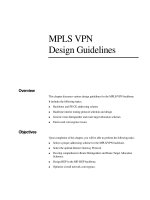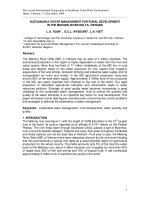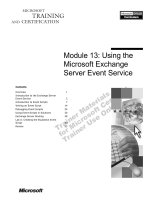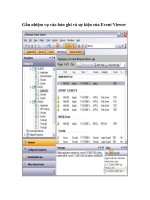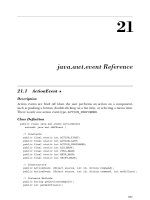Sustainable Event Guidelines pptx
Bạn đang xem bản rút gọn của tài liệu. Xem và tải ngay bản đầy đủ của tài liệu tại đây (303.31 KB, 16 trang )
Sustainable Event Guidelines
Vancouver Convention Centre – Sustainable Event Guidelines 1
Table of Contents
Introduction…………………………………………………………………………………2
Why Hold a Sustainable Event………………………………………………………… 3
What Does a Sustainable Event Look Like? 4
Sustainability Checklists………………………………………………………………….6
Next Steps………………………………………………………………………………….14
For Further Information………………………………………………………………….15
Vancouver Convention Centre – Sustainable Event Guidelines 2
Introduction
As our Clients become more aware of the positive contributions they can make in holding environmentally
friendly meetings, the Vancouver Convention Centre has developed this guide to help event planners
organize and hold sustainable meetings and events
The Vancouver Convention Centre has a strong commitment to economic, environmental and social
responsibility. By taking advantage of its existing green facilities and many sustainable programs, the
Vancouver Convention Centre is an ideal venue for hosting a sustainable event. Some best practices and
unique building features already in place include:
A “scratch” kitchen specializing in freshly prepared meals using locally produced and grown products and
offering locally produced wines from British Columbia’s award-winning wine regions.
A long-standing and extensive recycling program
The ability to offer zero-waste events in collaboration with clients and their suppliers
The West building has received LEED® (Leadership in Energy and Environmental Design) Platinum
A 2.4 hectare living roof contributing to the environmental performance of the expanded building
A unique marine habitat design built into the foundation of the expanded facility
Energy management systems to control and reduce energy consumption
Seawater powered heating/cooling system
Purchase of green power certificates
The facility will be carbon neutral by 2010 and is currently able to offer zero-carbon events in
collaboration with clients and their suppliers
Sustainability is an on-going process of continuous improvement and The Vancouver Convention Centre looks
forward to working with our Clients to maximize the benefits of sustainable meetings and events.
certification. We are the first convention centre in the world to earn the highest LEED® rating.
Vancouver Convention Centre – Sustainable Event Guidelines 3
Why Hold a Sustainable Event?
Implementing sustainable practices can reduce the impact of all event activities, while creating an experience
that is memorable and enjoyable for everyone involved. Holding a sustainable event has many benefits:
Reduce expenses
Something as simple as reducing paper and using electronic documentation avoids the costs
associated with purchasing, printing and distributing event collateral. Several small changes can
lead to significant overall cost savings for your event.
Save resources and reduce waste
Eliminating or reducing the use of items such as disposable glass, dishware and napkins saves
paper and reduces landfill waste.
Enhance brand and public image
A sustainable event says a lot about the values of your organization. It signals that your organization
is aware of environmental impacts and is willing to take action. It also shows that your organization
is willing to meet the increasing demands for sustainable options.
Create market opportunity
Experience as a sustainable event planner will keep existing green clients and open the door to new
ones.
Showcase environmental technologies and best practices
A sustainable event is an ideal opportunity to get creative and try out cutting edge technologies and
practices.
Educate and motivate event participants and employees
Being green not only affects the environment, it also impacts the well-being and experience of
everyone involved. Holding a sustainable event may encourage others to implement these same
technologies and practices in their own homes and businesses.
Encourage market transformation
As more and more sustainable events are held, the demand for sustainable products and services
will increase. This will encourage the development of sustainable industries and may also
encourage other related industries to implement these same practices.
Meet and exceed the expectations of event participants
Consumers are beginning to demand green options in all areas of their lives. Many participants may
not yet be aware that it is possible and cost effective to implement sustainable practices in a planned
event.
And most importantly, HELP SAVE THE PLANET!
Vancouver Convention Centre – Sustainable Event Guidelines 4
What Does a Sustainable Event Look Like?
Overview
It’s not always easy to visualize exactly what a sustainable event looks like. Some examples below help to
illustrate how sustainability can be incorporated into the major event activities covered in the guide.
Communications and Marketing
Paper consumption can represent significant costs associated with the communications and marketing
activities of a planned event. It is often considered a necessary cost of doing business. Yet, when looking at
a standard piece of paper, many of us do not consider the true cost of producing it. Conventional paper uses
chemicals that produce, along with the paper itself, harsh toxic substances and the living trees used to make
the paper provide priceless ecological services. Sustainable communications and marketing practices, such
as limiting paper usage or avoiding paper altogether, not only help the environment but also reduce
expenditures.
Food and Beverage
The food and beverage menu offers event staff a unique opportunity
to showcase local selections. It also provides event participants with
the opportunity to indulge in those selections. While this simple
practice incorporates the idea of sustainability, it also makes perfect
sense and enhances the event; participants from all over the world go
to the host city to experience its local culture, not somebody else’s.
Taking sustainability one step further means eliminating disposable
service ware, composting food waste, donating untouched prepared
food to shelters and missions, and using non-toxic cleaning products.
Best Practices at the
Vancouver Convention Centre
Did you know……Green food and
beverage practices at the
Convention Centre recycle
approximately 135 – 180 KG of
organic food waste per week.
Event Production
Best Practices at the
Vancouver Convention Centre
Did you know……The Convention
Centre has a comprehensive facility-
wide recycling program that diverts
approximately 180,000 kilograms of
materials away from landfills each
year.
With proper planning, the impact of vendors and cleaning services
can be reduced by using sustainable initiatives like creating a no
waste policy and using non-toxic cleaning solutions. Even the
impacts of energy directly consumed by event participants can be
reduced by buying green, renewable power. Plus, sustainable event
production manages waste and increases the success of recycling
initiatives, which means less garbage in our landfills.
Exhibits and Exhibitors
Depending on the type of planned event, exhibitors can play an important role in the event’s overall success,
as many participants attend a trade show or convention specifically to see exhibits and interact with
exhibitors. Along with interacting with event participants and showcasing their exhibits, exhibitors can also
be provided with guidelines that encourage sustainability by reducing waste and using exhibits and collateral
made of recycled materials.
Vancouver Convention Centre – Sustainable Event Guidelines 5
Accommodation
Best Practices at the
Vancouver Convention Centre
Did you know……The Convention
Centre is located within walking
distance of numerous
accommodation providers in
downtown Vancouver.
When it comes to accommodation for a sustainable event,
participants play a larger role than event planners in making their stay
a sustainable one. While event planners can select the location of
accommodations to reduce any transportation needs, event
participants have a responsibility to behave in a sustainable manner
by requesting that sheets and towels not be laundered every day, and
turning off lights, heating/cooling systems, and electronic devices.
Transportation
The impacts of transportation on sustainability can be significant; cars
and planes emit carbon dioxide that contributes to climate change,
more cars on the road increases gridlock, and travel to/from an event
can be a costly component for participants. Fortunately, there are
many ways to reduce transportation’s impact or eliminate its need
altogether using sustainable practices such as purchasing carbon
offsets, using mass-transit, and renting a bicycle.
Best Practices at the
Vancouver Convention Centre
Did you know……The Convention
Centre is at the nexus of mass-
transit services, including bus,
SeaBus, and SkyTrain.
Information Technology
Information technology-related activities might not seem like they
would have a big impact at something like a planned event. Personal
computers, laptops, projectors, and any other energy-hungry devices,
however, can have a big impact on energy consumption. These
devices usually stay plugged-in and powered-up for long periods of
time. Small changes, such as enabling sleep mode on laptops,
posting event materials online, and recycling electronic waste reduce
electricity costs and increase your sustainability profile.
Best Practices at the
Vancouver Convention Centre
Did you know……The Convention
Centre will arrange web-
conferencing for participants that
cannot physically attend the event.
Procurement
Procurement is an important activity to consider when planning a sustainable event. Environmentally
unfriendly products and services deplete resources and pollute the earth and steps can be taken to avoid
using these products and services at your event. Procurement is especially important because it applies to
all functions of hosting a sustainable event, from using recycled paper in printed materials to sourcing local,
organic food and ingredients.
Checklists & How to Use Them
Now we return to the question of what a sustainable event looks like. This will depend on many factors and
no two sustainable events need to look exactly the same. The level of sustainability that an event planner
chooses to implement is up to them, and may depend on the incremental costs and convenience of
implementing sustainable practices and selecting sustainable product and service providers.
The following section contains a checklist of guidelines created for each event activity. Using these checklists
will allow you to determine exactly what your sustainable event will look like.
Vancouver Convention Centre – Sustainable Event Guidelines 6
Communications and Marketing Guidelines
Paper Reduction
□ Minimize paper usage by encouraging participants to register online.
□ Give preference to electronic documentation over paper or use double-sided copying and printing.
□ Provide materials via PDA download or online where possible.
□ Format any distribution materials to minimize the amount of printed paper.
□ Work with event staff to evaluate past events of a similar scope and size to forecast the amount of materials and handouts
needed.
Selecting Recyclable & Recycled Materials
□ Use recycled, high (100%) post-consumer content paper where possible.
□ Use Forest Stewardship Council certified paper.
□ Print materials on an Energy Star certified printer and use vegetable-based inks.
□ Limit the use of paper that is difficult to recycle, such as glossy paper, goldenrod, and florescent paper.
Promotional Materials
□ Distribute advertising, promotion, and registration materials electronically.
□ Request that all banners or place cards are reusable and made from recycled content.
□ Give preference to mailing labels that use water-based adhesives.
□ Send event confirmations electronically or mail only when requested.
□ Limit the number of event program books available on-hand, encouraging participants to access the event program online.
Onsite Event Materials
□ Print any event collateral locally rather than printing material and shipping it to the event.
□ Reuse plastic name tag holders/lanyards and consider holding a draw to encourage participants to return the tag
holder/lanyards.
□ Request digital signage over paper signage, or use reusable signage made from recyclable materials.
□ Computerize the registration process at the opening of the event.
□ Transmit handouts, brochures, and session notes electronically at the end of the event via email and post materials on the
website.
□ Encourage the exchange of electronic event materials via USB drives.
□ Use dry erase white boards instead of paper flip charts.
□ Provide pens and notepads only if requested by participants and use pens and notepads with recycled content when
requested.
□ Ensure that any event sponsors subscribe to the environmental guidelines for promotional materials.
Speaker and Guest Materials
□ Encourage speakers/guests to provide electronic copies of handouts and post the materials on the event/organization website,
while periodically reminding participants of the website’s content.
□ When unavoidable, request that speakers/guests subscribe to the environmental guidelines for any promotional materials that
must be printed.
Vancouver Convention Centre – Sustainable Event Guidelines 7
Food and Beverage Guidelines
General
□ Confirm the guaranteed number of event participants in order to eliminate excessive food waste.
Elimination of Disposable Service Ware
□ Give preference to reusable glassware and dishware, including coffee mugs, over disposable dishware.
□ Encourage participants to use mugs at water coolers rather than disposable cups.
□ Use bio-degradable disposables if disposables are unavoidable.
□ Replace plastic/wooden stir sticks with reusable spoons.
□ Use cloth napkins, table cloths, or at the very least, compostable napkin.
□ Eliminate any additional wasteful usage of glassware/dishware by encouraging participants to drink right out of the can/bottle.
Food Service
□ Source locally-grown organic ingredients and in-season vegetables from local farmers.
□ Use fairly traded products, particularly fair trade, shade grown, organic coffee, tea, chocolate, and cocoa.
□ Avoid bottled water by requesting water served in jugs .
□ Avoid excess and throw-away packaging by encouraging suppliers to use re-usable containers.
□ Ensure food and beverage packaging is recyclable.
□ Give preference to condiments, ingredients, and beverages purchased in bulk.
□ Request that all food and beverage condiments are served in bulk containers rather than individual packets.
□ Avoid using garnishes or use only edible garnishes.
□ Arrange the donation of leftover untouched prepared food to local shelters and/or food kitchens.
□ Offer vegetarian meal selections, as vegetables require less energy input compared to meat selections.
□ Serve only seafood that was harvested in a responsible manner by asking if the seafood is farmed or fished, how well the
operation is managed, and the level of bycatch.
Alcoholic Beverages
□ Feature locally sourced alcoholic beverages.
□ Give preference to reusable ceramic or cork/wood coasters over disposable paper coasters.
□ Replace disposable drink napkins with reusable cloth napkins or compostable alternatives.
□ Request alcoholic beverages only from those producers whose packaging and containers can be easily recycled.
□ Ensure that all bottles and cans are properly recycled.
Food Composting
□ Verify that kitchen waste and prepared food that has been touched is composted.
□ Ensure that leftover untouched prepared food is not composted and instead consumed as staff meals in the facility or donated
to local food banks, missions, or charities.
Contracts and Suppliers
□ Clearly outline and communicate the event’s sustainability guidelines to all contractors and suppliers.
□ Include all the food & beverage sustainability guidelines in supplier contracts.
Vancouver Convention Centre – Sustainable Event Guidelines 8
Event Production Guidelines
Recycling Initiatives
□ Place recycling containers in various easy-to-access areas with adequate signage.
□ Arrange for recycling areas to be staffed with advisors that can guide recycling efforts and address any questions/concerns.
□ Provide small trash bins at reception areas only if requested, and provide no trash bins if the event’s objective is zero-waste.
□ Give participants advance notice of the general recycling programs at the event via email or post the information on the event’s
website.
□ Communicate recycling/waste prevention initiatives to event participants at the opening/general sessions and periodically
remind participants of the initiatives at intermissions.
Recycling Signage
□ Display clear signage indicating the type of recyclable material each container accepts, differentiating from cans, bottles, paper,
organics, etc.
□ Request digital signage if available, or use paper with recycled content.
□ If paper signage is used, follow the same guidelines outlined in Communications and Marketing.
Design and Décor
□ Request centerpieces and decorations that are organic, such as flowers, or that can be reused for future events.
□ If organic centerpieces are used, encourage participants to take the items with them, thereby eliminating waste.
□ Request that any other design features or décor items use materials that are both recycled and recyclable.
Food Services Suppliers
□ Request that reusable containers are used to transport any items/materials to and from the event.
□ Create a no waste policy that places the responsibility of disposing any garbage on the suppliers or vendors.
□ Consider charging a fee for excessive waste left at the event.
Cleaning Services
□ Ensure housekeeping staff uses only non-toxic, eco-friendly cleaning solutions such as Certified Green Seal products.
□ Request that housekeeping staff replace paper cleaning towels with reusable cloth towels.
Energy and Electricity
□ Purchase green power (or offset power consumption) during the event and notify participants of the renewably-sourced
electricity.
□ Make a request to the event facility manager to set the thermostat in the venue to a minimal, but comfortable, temperature in
order to decrease energy consumption.
Event Staff
□ Communicate the event’s sustainability guidelines to staff prior to the beginning of the event.
□ Ensure the staff is effectively trained on appropriate environmental behaviour such as sorting recyclables, minimizing waste,
and composting organic waste.
□ Create a green committee comprised of stakeholders from various parties to oversee the event and monitor the event’s
sustainability guidelines.
□ Develop a reward program that encourages responsible behavior from event participants, staff, and committee members.
Vancouver Convention Centre – Sustainable Event Guidelines 9
Exhibits and Exhibitors Guidelines
Reduced Packaging for Giveaways
□ Request that exhibitors not over-package any giveaways; if excessive packaging is used, ensure that exhibitors are held
responsible for discarding/recycling the packaging.
□ Encourage exhibitors to select giveaways made of recyclable materials or reusable items.
Exhibitor Promotional Materials
□ Extend environmental guidelines for communications and marketing materials to the promotional materials of exhibitors.
□ Communicate the expected number of participants to exhibitors in order to minimize any additional waste.
□ Encourage exhibitors to bring smaller quantities of promotional materials and require that exhibitors offer access to electronic
materials on their website as an alternative.
Packaging Materials
□ Encourage exhibitors to reuse any boxes or packaging that was used on arrival to the event venue.
□ Enforce a pack-in/pack-out policy or zero-waste criteria to ensure exhibitors leave with everything that was brought to the
event.
□ Discourage exhibitors from using any external chemical substances on-site.
Event Closing Protocol
□ Develop check-out procedures that require exhibitors to interact with event staff prior to departure, ensuring that their area is
clean and waste-free.
□ Enforce fines for exhibitors that leave discarded materials, trash, carpet, or anything that accompanied them to the event.
Recycled-Content in Display Booths and Exhibits
□ Encourage exhibitors to use recycled content in the fabrication and assembly of display booths/exhibits.
□ Encourage exhibitors to use booths/exhibits that can be reused for future events.
Reward Green Exhibitors
□ Reward exhibitors with a "green exhibitor award" at the end of the event, recognizing the exhibitor in front of all participants.
Vancouver Convention Centre – Sustainable Event Guidelines 10
Accommodation Guidelines
General
□ Identify any accommodation providers that are certified by an eco-rating program, such as TheGreenKey.
□ Highlight any accommodation providers that subscribe to a specific industry environmental code of practice, such as the
Tourism of Canada's Code of Ethics and Guidelines for Sustainable Tourism.
□ Request the in-house environmental policies/guidelines of potential accommodation providers and consider eliminating any
accommodation providers whose environmental policies/guidelines do not support the event’s sustainability guidelines.
□ Schedule a site visit with accommodation providers to verify on-site environmental policies.
□ Request that the accommodation provider dedicate a channel at the hotel that contains specific information about the event, as
well as any important updates.
□ Request that hotels change linens and towels every other day unless specifically requested by the guest.
Accommodation Location
□ Give preference to hotels within walking distance of the event venue, thereby eliminating the need for transportation and
allowing participants to walk from the hotel to the event and back.
□ If transportation is unavoidable, consider bundling accommodation and transportation by operating a shuttle from the hotel to
the event and back.
Cooperation from Event Participants
□ Ask event participants to reuse linen at their hotels rather than use laundry service everyday.
□ Remind participants to turn off the lights, television, and air conditioners or heaters when leaving their hotel room for an
extended period of time.
Vancouver Convention Centre – Sustainable Event Guidelines 11
Transportation Guidelines
General
□ Allow web-conferencing abilities for participants that cannot physically travel to the event.
□ Establish an idle-free zone around the event venue.
Low-Impact Air Travel
□ Notify event participants of the various airlines that allow passengers to offset their emissions.
Emissions Offsets
□ Partner with local offset companies and request them to setup a display booth/exhibit at the event and sell offsets directly to
participants.
□ Work with offset companies to offer emissions offsets at a discount rate if purchased in bulk.
□ Ask a representative from a local offset company to deliver a brief presentation on the importance of offsetting emissions.
□ Offer reduced attendance fees to event participants that purchase emissions offsets.
Shuttle to/from the Hotel
□ Encourage all participants to travel together to or from the event.
□ Work with accommodation providers to develop a schedule of pick-up and drop-off times.
Zero Emission Alternatives
□ Partner with local bicycle vendors to arrange bicycle rentals that give participants the option to ride between the hotel and event
and explore the city.
□ Establish appropriate bicycle storage areas with the facility manager.
Mass-Transit Passes
□ For hotels located across town or outside of walking distance, provide participants a bus or mass transit pass and directions on
how to travel between the hotel and event.
□ Include the cost of a transit pass in the overall fee of attending the event, for delegates who must use transportation to reach
the event.
Hybrid Vehicle Rentals
□ For participants who require a private vehicle, partner with car rental companies that offer hybrid vehicles.
□ Request that hybrid models are on reservation and ready for pick-up before the event.
□ Work with parking operators to allocate a certain amount of parking stalls for participants that arrive to the event in a hybrid
vehicle.
Hybrid Taxis
□ Use taxi companies that have a large hybrid fleet and encourage participants to specifically request hybrid taxis.
□ Notify taxi companies of the event prior to the start date and communicate the event’s sustainability guidelines.
Car-Pooling
□ Encourage car-pooling by dedicating a section of either the event’s website or the organization’s website that permits local
participants and car rental users to make arrangements.
□ Work with parking operators to allocate a certain amount of parking stalls for participants that car-pool to the event.
Vancouver Convention Centre – Sustainable Event Guidelines 12
Information Technology Guidelines
Website and Online Content
□ Request that the event venue or client organization create a section of its website that contains event materials accessible only
by participants or request that the event provides a link on its website to the organization’s website.
□ Notify and periodically remind participants of the website and its content.
Equipment
□ Encourage laptop usage over desktop computers, as laptops typically use less energy than desktops.
□ Use liquid crystal display (LCD) monitors instead of cathode ray tube (CRT) monitors.
□ Activate sleep mode on any equipment used in the event's production, including projectors, computers in the registration area,
and personal computers of participants.
□ If purchasing any equipment for the event, give preference to Energy Star products that use less energy.
Recycled Components
□ Request that recycled print cartridges are used when printing event-related materials.
□ Request that recycled print cartridges contain vegetable-based inks.
□ Recycle any electronic waste, such as print cartridges, that is left behind at the end of the event.
Vancouver Convention Centre – Sustainable Event Guidelines 13
Procurement Guidelines
Purchasing or Renting Products/Services from Suppliers.
□ Request products certified under established environmental standards, such as the Environmental Choice Program.
□ Closely evaluate claims of products that are identified as recyclable, recycled, biodegradable or sustainable.
□ Request verification and information from suppliers supporting claims of recycled content, sustainability, and other
environmental certifications (e.g. ISO 14001 EMS certification).
□ Use local suppliers to reduce the environmental impact of supplies, as local suppliers do not often have the level of emissions
associated with importing supplies.
□ Give preference to products that are easily reused and/or recycled.
□ Request that event-related products are purchased in bulk.
Historical Event Performance
□ Evaluate the resource usage of past events of a similar scope and size to anticipate the amount of supplies needed.
□ Reduce materials waste by considering the amount of leftover materials from previous events when estimating the amount of
materials to purchase.
On-site Materials
□ Request that vendors or suppliers take back any non-recyclable materials that were brought to the event.
□ Encourage vendors and suppliers to use the event’s recycling facilities, while discouraging them from using trash bins.
Vancouver Convention Centre – Sustainable Event Guidelines 14
Next Steps
Now that you have a clearer picture of what a sustainable event can look like, you can decide on what your
sustainable event will look like. This section describes how to actually host your event and how to work with
the Vancouver Convention Centre in implementing your chosen guidelines. With the help of the Convention
Centre’s team, it’s as easy as 1, 2, 3:
1 - PLAN
Using the checklists provided, select which sustainability guidelines to implement in your event.
Communicate the identified sustainability objectives and guidelines to your Vancouver Convention
Centre Event and Catering Managers. They are well-equipped to handle all your sustainability requests
at the Convention Centre.
Depending on the size of the event, contact either Tourism Vancouver or the accommodation provider
directly to inquire about pricing and arrangements for accommodations that meet your sustainability
requests.
If transportation is required, inquire about pricing and coordinate mass-transit needs with Translink,
British Columbia’s South Coast Transportation Authority, or arrange personal transportation directly.
After discussing pricing options, finalize the sustainability guidelines that will be implemented during the
event.
Create a communications statement on the selected guidelines and distribute it to event participants and
other stakeholders.
2 - DO
Bring up any additional requests that arise throughout the event with your Event and Catering Managers.
Incorporate the event’s sustainability guidelines into participant communications. This needs to be
reiterated at each communication opportunity.
Work with the Vancouver Convention Centre to measure the impact of any sustainability guidelines that
can be measured.
3 - CHECK
Evaluate the event’s sustainability guidelines, identifying successes and any areas that could be
improved for next time.
If any of the selected guidelines were measured, communicate the results to event participants.
Start planning the next sustainable event at the Vancouver Convention Centre!
Vancouver Convention Centre – Sustainable Event Guidelines 15
For Further Information
Information
Source
Title of Work URL Brief Description
Concern, Inc How to Plan a
Sustainable Event
/>sEvent_2003.pdf
Ideas on how to plan a sustainable event from
start to finish.
Canadian Tourism
Human Resource
Council
International Event
Management
Standard
The IEMS is a comprehensive framework
developed by the CTHRC that outlines a
preferred method of managing a sustainable
event
BSI British
Standards
n/a />and-Publications/Industry-
Sectors/Environment/BS-8901-case-
studies/
BSI British Standards case studies
exemplifying proficiency in BS 8901
(specification for a sustainable event)
standards.
Convention
Industry Council
Convention
Industry Council’s
Green Meetings
Report
/>s/green_meetings_report.pdf
Best practices and guidelines for event
organizers and event suppliers on running
environmentally friendly events and
implementing sustainable event policies.
David Suzuki
Foundation
How to Host a
Sustainable,
Carbon Neutral
Conference or
other Event
/>ge/What_You_Can_Do/carbon_neutral_e
vents.asp
The David Suzuki Foundation provides
guidelines on how to reduce the ecological
impact of large events.
Environment
Canada –
Greening
Government
Environment
Canada’s Green
Meeting Guide
/>B1C0BC-741C-4493-B4B7-
B0D56BBE6566/Green_Meeting_Guide_
07.pdf
The Green Meeting guide identifies major
steps for organizing a green event, including
checklists of best practices.
Environmental
Protection Agency
n/a The EPA green meetings site acts as a portal
to various sustainable event sources and also
includes basic information.
Greenbiz.com Greening Your
Business: A Primer
for Smaller
Companies
/>rce/greening-your-business-a-primer-
smaller-companies
Biz.com lays a groundwork of initiatives in
order to hold a sustainable event with a focus
on small companies.
National Recycling
Coalition
The National
Recycling
Coalition’s Green
Meeting Policy
/>s/greenteam-
toolkit/documents/NationalRecyclingCollo
litionGreenMeetingsReference.pdf
The Green Meetings Policy is a handbook of
green initiatives that outline the best practices
for various event components.
The Icarus
Foundation
Green Festivals
and Events Guide,
a How To…
/>es/Greening_Festivals_and_Events.pdf
A detailed “how to” guide on planning and
implementing a sustainable event.
